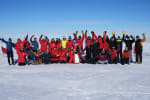Looks like someone doesn’t mind a little frost on the face. And notice their sunglasses, which reflect the cargo brought by the first SPOT of the season. That load included the seven main cables for the Upgrade deployment. One of those cable spools is shown below being lifted off the trailer sled by a large […]
IceCube-Gen2
Upgrade Update #5
The IceCube Upgrade project’s progress report for last week has earned the name, as “progress” smoothly continues. The drill camp now has two tower operations sites. One will serve as the installation practice site. The image above is a view looking down from one of the towers, with the wrapped-up drill supply hose reel centered […]
Upgrade Update #4
Last week’s excitement for the IceCube Upgrade project centered around moving the drill tower and operations structures into place. The location is over hole 87, which will be the first Upgrade hole (the IceCube detector has 86 holes). The installation team is also making progress on setting up the area for acceptance testing of the […]
Upgrade Update #3
As the season progresses, the IceCube Upgrade team continues to grow. Eight more arrivals last week brought the South Pole IceCube population up to 29. As newcomers acclimated, the “old-timers” kept up with the snow grooming around drill camp—things are looking good there. They continue to shovel out other structures and have been “harvesting” hoses, […]
Upgrade Update #2
After the first group of IceCubers spent a couple of days acclimating and reviewing the work needed to get the drill camp up and running, the crew went straight to work. The first order of business? Shoveling. And lots of it. They managed to shovel out most of the buildings in the drill camp. The […]
Upgrade Update #1
The first week of the final field season for the IceCube Upgrade started out with delays. Figures. Of course, even though that’s not what you hope for, uncooperative weather at the South Pole is a fact of life, something to deal with in stride. The first group of IceCubers for the Upgrade season had to […]
Quantifying the estimated sensitivity of the IceCube Upgrade to atmospheric neutrino oscillations
As cosmic rays collide with particles in the Earth’s atmosphere, air showers containing atmospheric muons and neutrinos are produced. The atmospheric neutrinos are then detected by DeepCore, a denser and smaller array of sensors in the center of the IceCube Neutrino Observatory at the South Pole. Compared to the main IceCube detector, DeepCore is sensitive […]
IceCube-Gen2 selected for German research infrastructure prioritization short list
IceCube-Gen2, the planned extension of the IceCube Neutrino Observatory at the South Pole, was among nine projects selected for the Federal Ministry of Research, Technology, and Space’s (BMFTR) short list of the most important and promising research infrastructure projects. Federal Research Minister Dorothee Bär made the announcement earlier this month. The BMFTR is the German […]
IceCube at ICRC 2025
The 39th International Cosmic Ray Conference (ICRC), the largest conference in the world for cosmic ray physics, was held on July 14-July 24 at the Geneva International Conference Center in Geneva, Switzerland. The main topics covered included cosmic-ray physics, gamma-ray astronomy, neutrino astronomy and neutrino physics, dark matter physics, solar and heliospheric physics, multimessenger astronomy, […]
Another successful field season for IceCube Upgrade at the South Pole
Since November of last year, a team of IceCube engineers and scientists have been hard at work during the second of three consecutive field seasons for the IceCube Upgrade. Over the course of the season, 37 team members, including 27 drill engineers and 10 installation and operations experts, were deployed to the U.S. National Science […]









